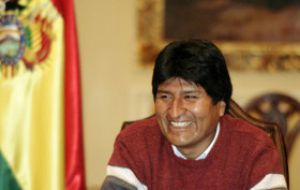MercoPress. South Atlantic News Agency
After victory Bolivian government calls on opposition
 Morales prepares for ther second Constitution battle
Morales prepares for ther second Constitution battle The government of Bolivia called on the opposition to accept the results of Sunday's constitutional referendum which are considered a huge victory for President Evo Morales, although the first official results (18% vote count) indicate a similar number of Ayes and Nays.
"The country no longer wants any problems or regional confrontations" said Interior Minister Alfredo Rada on Monday adding that the "people's will" freely expressed on Sunday's referendum "must be respected". The first partial results give the No vote 50.21% and the Yes vote, 49.79%, but the general consensus among politicians, pollsters and the press is that this first batch of vote-count is not representative and based on Sunday's exit polls and "quick counts" the new constitution will finally be approved by a margin between 58% and 60%. Government and opposition admit the 58/60% victory for the new constitution which grants the country's indigenous population a greater say in government and justice affairs, as well as a greater share of oil and gas revenues for the poor provinces and enables President Morales re-election. But it has also been accepted that the No vote margin was significant in the provinces ruled by the opposition which is very jealous of its rich farmland, natural resources and is very much pro-business and against central government intervention. Rada said that the time has come for Congress to play its role "and honour obligations with the people" by approving a package of laws" to implement the new constitution. "We must find the appropriate levels of dialogue" to ensure the implementation of the new constitution "at the respective levels, particularly in reference to autonomy". The conservative ruled provinces at the height of discussions leading to the drafting of the constitution they reject, threatened with regional autonomy and even secession, which was thwarted by strong warnings from Brazil and Argentina. This however did not prevent outbreaks of violence, rioting and even killings, but finally managed a watered down version of the constitution, which in its original version was far more radical. Rada said that the government would soon convene the "Council for Autonomies" with the purpose of giving "the regions a democratic reply. The law of all laws must become effective but must also respect the will of the minority that voted NO". The Bolivian minister of Interior praised the attitude of Governor Ruben Costas, from Santa Cruz the richest and most rebellious of the dissenting provinces. "His acceptance speech was of great realism and patriotism", he said. Not so that from Governor Savia Cuellar from Chuquisaca province that openly called "not to abide by the new Constitution". But political analysts in La Paz also point out to the fact that is spite of the Yes victory, President Evo Morales can't ignore the fact that four (out of nine) of the richest provinces, Santa Cruz, Tarija, Beni and Pando, were overwhelmingly against the constitution. President Morales won in La Paz, Oruro, Potosi and Cochabamba with Chuquisaca too close to call a winner but with a slight No edge. "Mathematically the Yes vote won with 60%, but politics is not pure mathematics. What we are seeing is a reshuffling of the political scenario and forces, with many months of discussions before the new constitution is finally implemented", said political scientist Jorge Lazarte. President Morales has ample support in the Lower house but is limited in the Senate where the opposition can block legislation. In related news Unasur (Union of South American Nations) said that Sunday's referendum in Bolivia was "completely normal" and praised the "democratic and peaceful" spirit evident during the voting. Unasur was one of several multilateral organizations that sent observers to monitor the development of Sunday's vote.




Top Comments
Disclaimer & comment rulesCommenting for this story is now closed.
If you have a Facebook account, become a fan and comment on our Facebook Page!